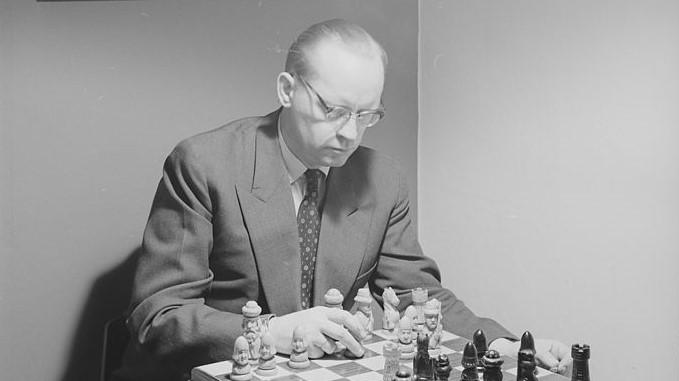
The King Of Norwegian Chess. The Start Of My Week In Chess.
As Bob Seger would have said, a long train rolling here, so best to hop on and off. Jump on - jump off when you have the time to spare. ( Yeah - must stop doing these long posts, but it's my nature!! One bit of chess leads to another aso.)
A few days ago I was searching for something in an old volume of Fialla's Quarterly For Chess History - my 'Chess Lucky Bags'. As usual, I ended up looking at something completely different to what I had originally been searching for!! Ask me why I could never do this stuff for a living. ![]()
It was an Article 'Olaf Barda ( 1909 - 71 ) The King of Norwegian Chess.' By Oystein Brekke. I knew the name well, but not the story of the man.
He was the first International Master from Norway, and also - as I already knew him - Norway's first Correspondence Chess Grandmaster. He earned that title at the first World Correspondence Chess Championships.
He is also the subject of general confusion for researchers!! He was actually born as Olaf Martinus Olsen in Kristiania. Both he and his birthplace later changed their names!! Kristiania became Oslo, and - in 1942 according to one source - Olsen, who had represented his country and also been Norwegian Champion under that name became Barda!
To add to the confusion, his son also represented Norway! I have a very nice picture of the young Yngvar Barda, playing against Bent Larsen.

Well, I was off on one of my chess trains of thought!! While looking for Barda games, I came across a truly incredible one, which Is why I sat down to write this - just to share it with my handful of readers. I won't promise that it will make you a better player, but i am sure you will enjoy it.
Barda's opponent was one of the famous trio of late pre-war days. A rare picture that has all three of them.

The game - have fun with it!!
The game I went to find was from the first World Correspondence Chess Championships.

Britain's Gabriel Wood was an interesting story in his own right - once believed to be a spy! One for another time.
This is the game I had gone looking for. Readers of my last blog will understand! His opponent is a well known chess figure. https://www.chess.com/forum/view/general/john-w-collins-by-william-lombardy

Back with more No-Castling Chess in a bit!!![]()
One of the finalists was this man - Edmund Adam.

A Doctor of Medicine, he was a very important figure in the IFSB- the organisation based in Germany that preceeded the iccf, and a very strong player in his own right. He qualified for that tournament by winning the last IFSB tournament - those events were basically the World Correspondence Championships of the time.

A previous winner was one of my chess heroes, the Great Dr. Milan Vidmar.
The game between the two has one of the great artistic achievements in the history of correspondence chess. As Alekhine said, when you had outplayed Vidmar strategically, you had to take special care - he could find the most incredible tactical surprises!! This one is a stunner. I have quickly added a little of what Vidmar gives in his wonderful book Goldene Schachzeiten, just because I adore Vidmar's game notes,
Well, that was not the first time that Vidmar had ended a game with the idea of Re4ch. he considered this game to be the most beautiful one he ever played.
Another winner of the IFSB tournaments was a young man called Paul Keres. Researching this I found a wonderful photo - I have never seen it on the internet, so perhaps 'you saw it here first', so to speak. The young Keres in his first real international tournament. The first time he was able to compete with - and win against - players of, as he put it in his own best games collection, recognised International master status.

His win over another Swedish player was perhaps his first over a player of that catagory. It was one of the first that I ever studied in any depth, being number 4 in the translation of his best games. Back to the 'No-castling', this game stuck in my head, as both players moved their King early in the game.

I hope you enjoyed the ride, and thanks for indulging me by staying on the train for the full journey. Take care everyone. Cheers! Simaginfan.